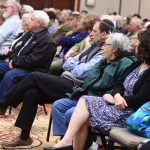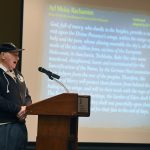MORGANTOWN — David Wisnia’s survival at Birkenau and Auschwitz during the Holocaust wasn’t just a singular miracle, but the grand sum of hundreds of smaller miracles that helped lead the Polish-born Jew from death’s door to the 101st Airborne Division of the U.S. Army early in 1945.
It is a story, apparently, far more spectacular than any fiction you can imagine — a story that enticed a packed house at the Morgantown Event Center on a chilly Sunday afternoon.
“I had to make up my mind to stay alive,” Wisnia said following Sunday’s performance in Morgantown. “I realized I had one relative alive — my mother’s younger sister who left (Poland) about six months before the war broke out.”
Wisnia’s story and his performance as an accomplished Cantor come just days ahead of Yom Hashoah — the Holocaust Memorial Day often marked by 24 consecutive hours of reading names of the dead.
Of the 580 people who accompanied Wisnia to concentration camps from his neighborhood in Warsaw, just six remained when the then 18-year-old attempted his first escape.
“I was in Auschwitz for close to three years,” Wisnia said. “I knew what was going on.”
He was given some preferential treatment — or what passed for preferential treatment in the Nazi work camps and death camps — because the young Wisnia was an accomplished singer since he was a boy.
His singing kept him alive, helped him make a connection with another “privileged” prisoner who became his first girlfriend, and resulted in his num-ber being removed from the death ledgers at least five times.
“I knew when the transport came,” he said. “The majority of them were gassed or killed.”
But not Wisnia. World War II began the day after his 13th birthday with the German invasion of Poland. He spent the better part of his youth watching people die. His singing kept him alive, and he adopted a mantra to make it through one more day.
“Germany believed in the propaganda more than anybody else,” Wisnia said. “They believed in the propaganda that the Jews were the only ones who had the money in Europe.”
By the time he was 18 in late 1944, the war was going badly for Nazi Germany. Wisnia attempted to escape once with a group, but he was recaptured. He was only spared a swift execution because of how poorly the war was going for Germany, which was being attacked on multiple fronts by the Soviets and the Allied forces who touched down in Normandy earlier that year. They needed able-bodied men to use as slave labor — meaning the 18-year-old Wisnia would be spared.
When he attempted escape for a second time, he went alone. He wouldn’t comment on the escape beyond, “I had a shovel. You don’t need to know more than that.”
And in early 1945, still on the run from the Nazis, Wisnia ran into the 101st Airborne Division as they marched on from The Battle of the Bulge. They eventually put a rifle in his hand, but Wisnia’s particular skillset was in language. When a German defeat became inevitable, Wisnia said many German soldiers were willing to lay down their arms; he had a gift for talking them down.
That wasn’t the case for the S.S., though. Wisnia’s role, many times, was to try and talk them into surrender, rather than create more bloodshed. It wasn’t always a success.
And then, the war was over. But Wisnia couldn’t return to his former home.
“I wasn’t going to go back to Poland. There was nobody left. My family was killed.”
So, he came to America.
“That’s the only place I could go.”
He married his late wife of 69 years, Hope, at the age of 22. He spent time in the book publishing industry and managing an office in Philadelphia, but eventually it was his singing voice that helped him leave his mark on Jewish communities in the tri-state area.
It was in 1950 that he went to a service at a new Synagogue in Levittown, Pa., a suburb of Philadelphia. Then a 24-year-old Holocaust survivor, he brought his own particular baritone stylings as a Cantor — the official who sings and leads prayer in a synagogue.
“They were just building it in 1950, and I listened to the Cantor of the new congregation,” he said. “I got sick — the music that they used. I said, ‘What kind of music is that?’ I said, ‘You want to hear good music?’
“I became the Cantor of that Congregation. I was there for 28 years.”
Afterwards, Wisnia continued to impress Jewish-Americans with his music, which in a far distant life could have been heard on Polish State Radio.
“I went in for a test to become formally a Cantor. They took me into New York to the Union of American Hebrew Congregations. Eight guys are sitting around on Fifth Avenue near the park. They’re going to test me if I know enough Hebrew. Hebrew was my first language.”
The test began, fully in Hebrew. It was then that Wisnia actually corrected the man testing him.
“He started talking, so I corrected the guy. He looks at me and says, ‘Do you know Hebrew?’” Wisnia said, laughing.
He spent another 23 years at Har Sinai, in Trenton, N.J., which is where he met Morgantown native Laurent Levy.
“Survivors have a personality, and sometimes it’s difficult,” Levy said. “And when I got to know Cantor Wisnia, there were so many parallels between Cantor Wisnia and my mother. I got a sympathy or an understanding. He helped me understand my mother.”
All five of Levy’s children and stepchildren trained to become a Bar or Bat Mitzvah under the watchful eye of Wisnia. During the course of this time, he began to learn about Wisnia’s remarkable life story.
“It’s a very visual story that just needs to be told,” Levy said.
Now living in Yardley, Penn., Levy had an idea that he could bring Wisnia to Morgantown — tell the story, perform some songs, sign some books and meet people both inside and outside of Morgantown’s lone Jewish congregation.
“I thought that there would be a really good response,” he said. “I felt my hometown would respond to him.”
That response brought out Dr. Ted Vehse, a humanities and religious studies professor at WVU.
“To pick up a weapon and become a member of the army that was liberating Europe, he turned on a dime,” Vehse said. “This is a remarkable individual achievement. It’s a kind of testimony to the human spirit.”
Dr. Vehse said the true nature of Nazi atrocities are far deeper than any caricatures the human mind can develop.
“The real issue is the insidious bureaucratic nature of the whole thing,” he said. “This was going on at an incredibly minute level.”
He said the Nazi bureaucracy had the extermination of undesirable populations, particularly Jews, down to a science.
“There was not a village, there was not a town anywhere in Germany that didn’t have some kind of a camp, some kind of concentration area that wasn’t feeding into this larger system,” Vehse said. “My remarks in the beginning, I referenced a factory-like system that was continent wide. That was literally the way it worked.”
Quickly, Germans and other Europeans alike were becoming desensitized to the true brutality of Nazi behavior.
“Turning a blind eye was a terrible problem across the spectrum of life,” Vehse said. “Not only in Germany but elsewhere in Europe, as well.”
That’s what drew Vehse to Wisnia’s story.
“These things did happen, and because they did happen, we know that they are possible,” Vehse said. “And if we want to make sure that nothing like this ever happens again, it’s important to embed that story deeply in the routine telling of human history, as well as the history of individual nations around the globe.”
The Nazis had a number of means involved for dehumanizing their enemies — including stripping them of their names and replacing those names with numbers. Wisnia was tattooed with the number 83526.
Wisnia had a plastic surgeon remove the numbers on his arm not long after arriving in America – something he now regrets. But Wisnia said he never forgot the numbers.
Those numbers don’t define who he is, but they define the coda he now lives by.
“Genesis 12: And be a blessing,”
Wisnia said. “In other words, do some good to improve this world. If you can do anything at all to make this world a little bit better, do it.”
Wisnia wrote “One Voice, Two Lives,” a memoir of his journey from the Warsaw Ghetto, Birkenau Concentration Camp, Auschwitz, and into the 101st Airborne Division.
Now, the Morgantown-native Levy, who accompanied Wisnia on a trip back to Auschwitz several years ago, is attempting to adapt that story into a screenplay. Levy said he’s interweaving Wisnia’s story with another one — Wisnia’s forced departure from Har Sinai as their Cantor.
“In the screenplay, I’m weaving that story — his dismissal,” Levy said. “The people at Har Sinai didn’t realize the treasure they had with his heart.”
Wisnia said there are a number of people attempting to adapt the book, but they must first understand his message:
“Be good,” Wisnia said. “Do some good. Improve this world. Be against prejudice. People are people, period. There are good people all over the place, and it doesn’t matter who they are really — what color, persuasion, whatever they are.”








